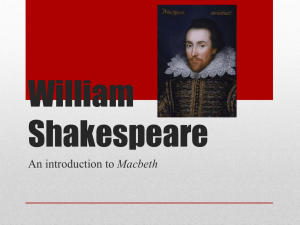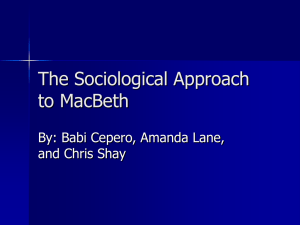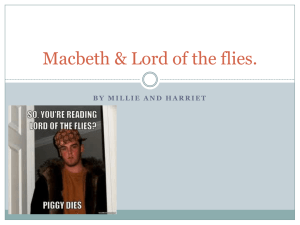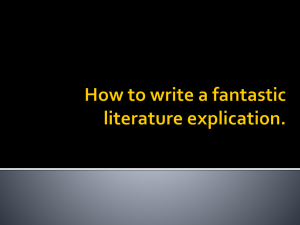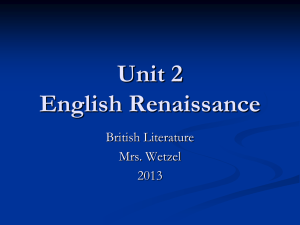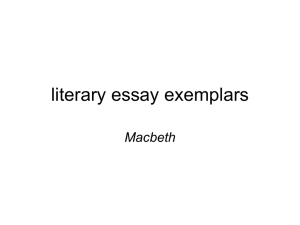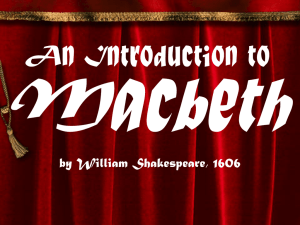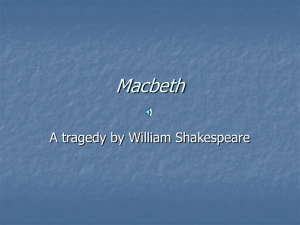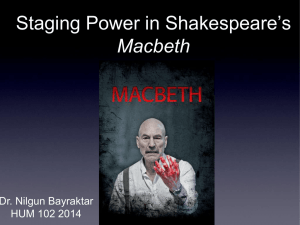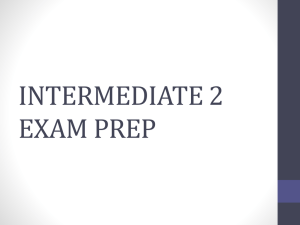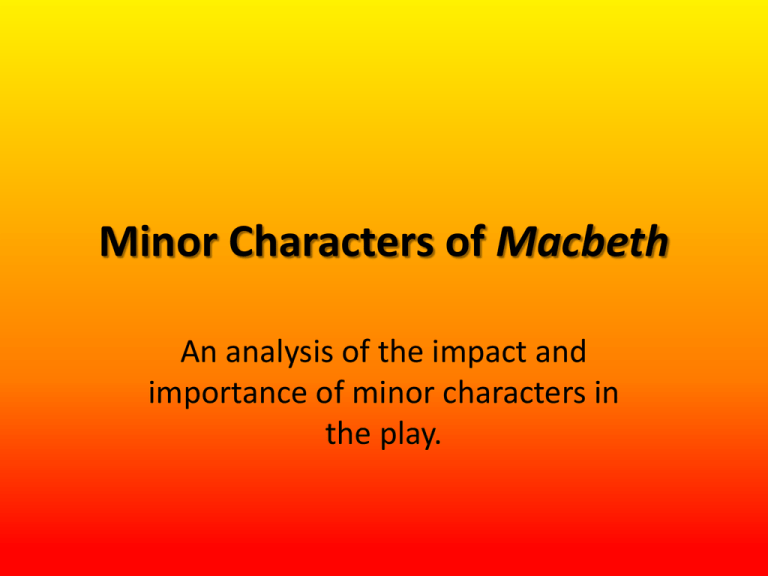
Minor Characters of Macbeth
An analysis of the impact and
importance of minor characters in
the play.
Macdonald, Thane of Cawdor
• A parallel of Macbeth, both have held title of Thane of Cawdor
• Like Macdonald, Macbeth becomes a traitor, a symbol for ultimate
evil within the play.
– “The merciless Macdonald/ (Worthy to be a rebel, for to that/
The multiplying villainies of nature/ Do swarm upon
him)…/…/And fortune…/ Show’d like a rebel’s whore…/ For
brave Macbeth (well he deserves that name)” (1.2.9-16)
• Macbeth, who begins the play as a worthy saviour from a dreaded
enemy, later becomes under the name of Thane of Cawdor, the
symbol for treason.
– “Hail, king! for so thou art: behold where stands/ The usurper’s
cursed head.” (5.8.54-5)
Ross
• The messenger to all of the major characters of the play, he serves
to advance the plot.
– He informs the King of Macbeth’s victory over the Thane of
Cawdor, fulfilling the witches prophecy in Act 1, scene 2.
– Provides Macbeth his new title, rooting his desire to become
king in Act 1, scene 3.
– Informs Macduff of the slaughter of his family, creating a desire
in Macduff to kill Macbeth and fulfill the prophecies of the
apparitions.
Lennox
• The everyman of the Scottish people.
• Symbolizes the suspicion of Macbeth by the Scotland.
– “My former speeches have but hit your thoughts/…/ Where he
bestows himself?” (3.6.1-24)
• Uses a sarcastic and sceptical tone within the play.
– “Those in his chamber, as it seem’d, had done’t.” (2.3.101)
Edward the Confessor
• The King of England
• Moral high ground, emphasizing the superiority of England.
• Described as “the most pious Edward with such grace / That the
malevolence of fortune nothing / Takes from his high respect”
(3.6.27-29) by a Lord, his moral character is contrast with Macbeth’s
regicidal ways.
• His character is an antidote to the corruption that Scotland has
developed as a result of Macbeth usurping the crown. It is also a
subtle reminder of the superiority of the English over the Scots,
since the play may have been written for King James I, who was
King of England at the time of the origin of this play.
Porter
• Serves to be the comic relief during the murdering of the King.
• Uses vulgar and burlesque diction.
• “Marry, sir, nose-painting, sleep, and urine. Lechery, sir / it
provokes, and unprovokes: it provokes the desire, but it takes
away the performance.”(2.3.25-27)
• Lower class status of the Porter is presented by Shakespeare
through the use of discussing: urine, sex, drunkenness.
Physician
• The Doctor of Physic, or physician, appears in Act V as the
forces against Macbeth threaten to overwhelm him.
– Initially, he attempts to treat Lady Macbeth for her sleepwalking
disorder. He calls it “a great perturbation in nature” (V.i.10).
• He appears to be extremely perceptive.
– He asks questions like “How came she by that light?” (5.1.22),
notes “What a sigh is there! The heart is sorely charg’d” (5.1.53)
– Remarks “Foul whisperings are abroad: unnatural deeds / Do
breed unnatural troubles: infected minds / To their deaf pillows
will discharge their secrets” (5.1.70-72).
Task
• Discuss and extend characters from Macbeth
such as the Doctor who is never seen again.
– What will he say to the next patient he sees, will
he tell of the horrors of what he has seen at
Macbeth's castle?
• Creative Writing: Write a one page short
narrative (1 page) of the Doctor’s comments
to others regarding Macbeth’s castle and its
happenings.
Bibliography
• Shakespeare, Macbeth. Macbeth. Edited by Roma Gill. Oxford
University Press: 1977.
• Website “Macbeth by William Shakespeare: #7 – Significance of
“cameo appearances” by Minor Characters”. Website. (30 May
2011) <http://intensecogitation.info/2010/06/19/analysis-of-thesignificance-of-cameo-appearances-by-minor-characters-inmacbeth/>



